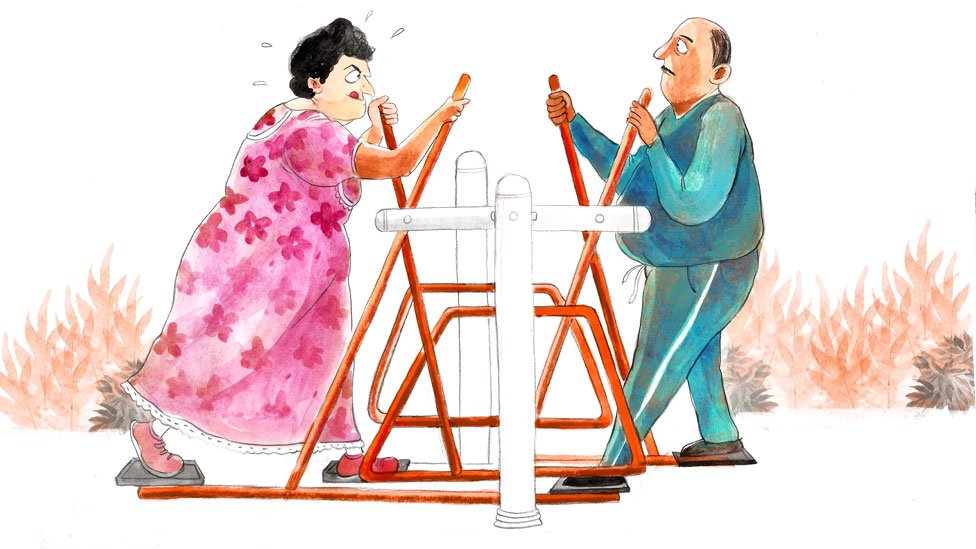
Image copyrightPriya KuriyanA committee of village elders in southern India has banned women from wearing nighties during the day.As the name suggests, nighties, sometimes also called maxis here, are loose, shapeless garments which were originally meant to be sleep wear.
But over the years, they have become a favourite daytime dress for millions of women, especially housewives, across Indian cities, towns and even villages.Four months ago, a nine-member council in the village of Tokalapalli in Andhra Pradesh state, surprisingly headed by a woman, ordered that girls and women must not wear nighties from 7am to 7pm and those who did would have to pay a fine of 2,000 rupees ($28; 22).Those who snitched on anyone breaching the ban were promised a cash reward of 1,000 rupees.The order is being strictly followed by the villagers and, so far, there have been no reports of anyone being penalised.
Village elder Balle Vishnu Murthy told a visiting colleague from TheIndianSubcontinent Telugu that the ban was to stop women from exposing their bodies.
"It is okay to wear nighties at home but wearing them outdoors could attract attention and cause trouble for the wearer," he said.Image copyrightPriya KuriyanSome residents - both women and men - said they opposed the order but had fallen in line because otherwise they would have to cough up the fine, which is a significant amount of money in this village of fisherfolk.This is not the first time the humble nightie has invited the wrath of the "moral police".
In 2014, a women's group in a village near Mumbai called daytime nightie wearing an "indecent practice" and threatened to impose a fine of 500 rupees on violators.
That ban fizzled out because the women refused to abide by it.But why are there such strong feelings about what is essentially just a piece of clothing And a piece of clothing that is generally looked at with much disdain by anyone who appreciates fashion Writing in the Mint newspaper in 2014, Shefalee Vasudev, editor of the recently-launched digital fashion portal The Voice of Fashion, said the nightie was "as shapely as a potato sack and as insipid as a stale marshmallow" and wanted it to be "dubbed as India's Top Fuddy Duddy Garment".Image copyrightPriya KuriyanBut talking to the TheIndianSubcontinent recently, Ms Vasudev said she believed that the village council ban had been dictated by the "moral police" rather than the "fashion police".Nighties are a multi-million dollar business and markets across the country are full of ready-to-wear designs.
The most popular ones are made from floral printed cotton and can be bought for as little as 100 rupees, although the premium range can cost a few thousands.
Designer Rimzim Dadu says nighties are so popular with housewives because traditional attire like the sari is not the best or most comfortable garment for doing household chores in.
The nightie, she says, has set them free.Designer David Abraham adds: "It's not the most elegant garment but it has become a uniform of sorts for women because it's convenient and practical.
It meets all their requirements - it's a single piece of clothing so you just pull it on, it's ankle length and covers the entire body so it's modest too." Both Ms Dadu and Mr Abraham are appalled by the ban - Ms Dadu calls it "outrageous" while Mr Abraham describes it as "ridiculous".Nighties are believed to have first arrived in India during British colonial rule as night gowns worn by English women.
In time, they were adopted as night wear by elite Indian women.It's not clear when the nightie moved from the bedroom to the streets, but Shefalee Vasudev says while growing up in the 1970s in small-town Gujarat, she saw "mummies and aunties" wearing them through the day and sometimes even going out dressed in them to the local market to shop.
Image copyrightPriya KuriyanIn the 90s, when she moved to Delhi, she says she was astonished to see young mothers wearing it while doing the school bus run with their children or haggling with roadside vegetable vendors.It's a real eyesore, she says, when women wear it with "mis-matched petticoats if the garment is thin and throw a cotton dupatta [scarf] over it to appear modest".Ms Vasudev says she understands the nightie's appeal in the middle-class housewife's life - as "the garment of liberation" which frees them from the confining sari.But what she can't understand is the "patriarchal moral police" describing the nightie as "obscene" and trying to ban it."It can't be called sexy or obscene," she insists.
"In fact, it's one of the most desexualised pieces of crap that a woman can wear."She says the reason why some want to banish the nightie is because they believe it's "more Western, more modern" and hence, it's obscene.
David Abraham agrees.
"Obscenity lies in the eye of the viewer," he says, describing the ban as "totally illogical".The village council order, he says, is gender driven and all about patriarchy and power.
"Have you ever heard about a village council meeting to decide what men wear It's always about women's clothing.
The belief the moral police have is today it's a nightie, tomorrow - who knows"

 13
13







